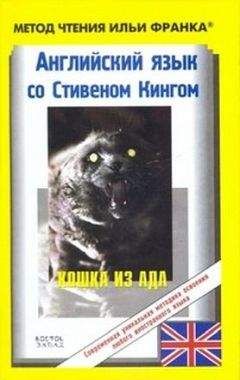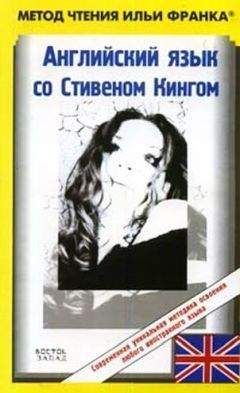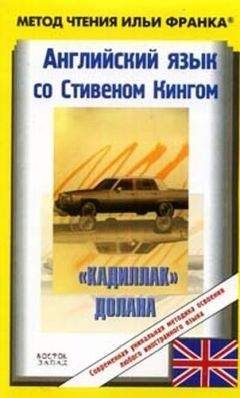Stephen King - Английский язык с Стивеном Кингом "Дети кукурузы
grimace [grI'meIs], inexpert [In'ekspWt], iniquitous [I'nIkwItqs]
He grimaced at the words stamped on the cover, done inexpertly in gold leaf: THUS LET THE INIQUITOUS BE CUT DOWN SO THAT THE GROUND MAY BE FERTILE AGAIN SAITH THE LORD GOD OF HOSTS.
There seemed to be one train of thought around here, and Burt didn't care much for the track it seemed to ride on.
He opened the book to the first wide, lined sheet. A child had done the lettering, he saw immediately. In places an ink eraser had been carefully used, and while there were no misspellings, the letters were large and childishly made, drawn rather than written. The first column read:
Amos Deigan (Richard), b. Sept. 4, 1945 — Sept. 4, 1964 (Амос Дейган (Ричард), род. 4 сент. 1945 г. — 4 сент. 1964 г.; b. = born— родившийся; родился/родилась; Sept. 4, 1945= September /the/ forth, nineteen forty-five)
Isaac Renfrew (William), b. Sept. 19, 1945 — Sept. 19, 1964
Zepeniah Kirk (George), b. Oct. 14, 1945 — Oct. 14, 1964 (Oct. = October)
Mary Wells (Roberta), b. Nov. 12, 1945 — Nov. 12, 1964 (Nov. 12 = November /the/ twelfth)
Yemen Hollis (Edward), b. Jan. 5, 1946 — Jan. 5, 1965 (Jan. 5 = January /the/ fifth)
Frowning, Burt continued to turn through the pages (сдвинув брови, Берт продолжал листать страницы; tofrown— хмурить брови; насупиться; смотреть неодобрительно). Three-quarters of the way through (через три четверти книги: «три четверти пути через/от начала до конца»), the double columns ended abruptly (двойные колонки неожиданно кончились; abrupt— внезапный, неожиданный):
Rachel Stigman (Donna), b. June 21, 1957 — June 21, 1976 (Рахиль Стигман (Донна), род. 21 июня 1957 — 21 июня 1976)
Moses Richardson (Henry), b. July 29, 1957 (Моисей Ричардсон (Генри), род. 29 июля 1957)
Malachi Boardman (Craig), b. August 15, 1957
The last entry in the book was for Ruth Clawson (Sandra), b. April 30, 1961 (последняя запись в книге касалась: «была для» Руфи Клоусон (Сандры), рожденной 30 апреля 1961). Burt looked at the shelf where he had found this book (Берт посмотрел на полку, где = накоторой он нашел эту книгу) and came up with two more (и обнаружил еще две; to come up —подниматься; появляться;/with smth./ находить/что-либо/). The first had the same INIQUITOUS BE CUT DOWN logo (на первой был тот же девиз/логотип "да будут истреблены неправедные"), and it continued the same record (и в ней продолжались такие же записи), the single column tracing birth dates and names (единственная колонка, отслеживающая даты рождения и имена). In early September of 1964 he found Job Gilman (Clayton), b. September 6 (в начале сентября 1964-го он нашел Иова Гилмана (Клэйтона), рожденного 6 сентября), and the next entry was Eve Tobin, b. June 16, 1965 (а следующая запись была: Ева Тобин, рожд. 16 июня, 1965). No second name in parentheses (без второго имени в скобках).
continue [kqn'tInjH], abrupt [q'brApt], parentheses [pq'renTIsIs]
Amos Deigan (Richard), b. Sept. 4, 1945
Sept. 4, 1964
Isaac Renfrew (William), b. Sept. 19, 1945
Sept. 19, 1964
Zepeniah Kirk (George), b. Oct. 14, 1945
Oct. 14, 1964
Mary Wells (Roberta), b. Nov. 12, 1945
Nov. 12, 1964
Yemen Hollis (Edward), b. Jan. 5, 1946
Jan. 5, 1965
Frowning, Burt continued to turn through the pages. Three-quarters of the way through, the double columns ended abruptly:
Rachel Stigman (Donna), b. June21, 1957
June 21, 1976
Moses Richardson (Henry), b. July 29, 1957
Malachi Boardman (Craig), b. August 15, 1957
The last entry in the book was for Ruth Clawson (Sandra), b. April 30, 1961. Burt looked at the shelf where he had found this book and came up with two more. The first had the same INIQUITOUS BE CUT DOWN logo, and it continued the same record, the single column tracing birth dates and names. In early September of 1964 he found Job Gilman (Clayton), b. September 6, and the next entry was Eve Tobin, b. June 16, 1965. No second name in parentheses.
The third book was blank (третья книга была пустой/неисписанной).
Standing behind the pulpit, Burt thought about it (стоя за кафедрой, Берт размышлял над этим).
Something had happened in 1964 (что-то случилось в 1964). Something to do with religion, and corn… and children (что-то связанное с религией и кукурузой… и детьми).
Dear God we beg thy blessing on the crop (возлюбленный Боже, мы просим /ниспослать/ Твое благословение на урожай; thy/арх./ = your). For Jesus' sake, amen (ради/во имя Иисуса, аминь).
And the knife raised high to sacrifice the lamb (и нож был занесен высоко, чтобы принести в жертву агнца) — but had it been a lamb (но был ли это агнец)? Perhaps a religious mania had swept them (возможно, религиозный фанатизм охватил/увлек их всех; tosweep— мести; увлекать, заинтересовывать). Alone, all alone (одни, совершенно одни), cut off from the outside world by hundreds of square miles of the rustling secret corn (отрезанные от внешнего мира сотнями квадратных миль тайной/заветной шуршащей кукурузы; secret— секретный, тайный; скрытый; уединенный; изолированный). Alone under seventy million acres of blue sky (одни, под семьюдесятью миллионами акров голубого неба). Alone under the watchful eye of God (одни, под внимательным взглядом: «глазом» Бога), now a strange green God (нынче чужого, зеленого Бога), a God of corn, grown old and strange and hungry (Бога кукурузы, ставшего старым, чужим/странным и голодным; to grow— произрастать, расти; делаться, становиться). He Who Walks Behind the Rows (тот, кто обходит ряды).
blank [blxNk], amen ["R'men], mania ['meInIq], sacrifice ['sxkrIfaIs], acre ['eIkq]
The third book was blank.
Standing behind the pulpit, Burt thought about it.
Something had happened in 1964. Something to do with religion, and corn… and children.
Dear God we beg thy blessing on the crop. For Jesus' sake, amen.
And the knife raised high to sacrifice the lamb — but had it been a lamb? Perhaps a religious mania had swept them. Alone, all alone, cut off from the outside world by hundreds of square miles of the rustling secret corn. Alone under seventy million acres of blue sky. Alone under the watchful eye of God, now a strange green God, a God of corn, grown old and strange and hungry. He Who Walks Behind the Rows.
Burt felt a chill creep into his flesh (Берт почувствовал, как внутри все холодеет: «как холод вползает/пробирается в его плоть»).
Vicky, let me tell you a story (Вики, хочешь: «позволь» я расскажу тебе историю). It's about Amos Deigan (она об Амосе Дейгане), who was born Richard Deigan on 4 September 1945 (который родился Ричардом Дейганом 4 сентября 1945). He took the name Amos in 1964 (он взял имя Амос в 1964), fine Old Testament name, Amos (красивое имя из Ветхого Завета — Амос; fine— тонкий; изящный, красивый; хороший, прекрасный), one of the minor prophets (один из малых пророков; minor— незначительный, второстепенный; меньший; младший; theMinor Prophets — малые пророки /малые пророческие писания Ветхого Завета: книги пророков Даниила, Осии, Иоиля, Амоса и др./). Well, Vicky, what happened (так вот, Вики, случилось то) — don't laugh (не смейся) — is that Dick Deigan and his friends (что этот Дик Дэйган и его друзья) — Billy Renfrew, George Kirk, Roberta Wells, and Eddie Hollis among others (и Эдди Холлис среди прочих) — they got religion and they killed off their parents (они ударились в религию и поубивали своих родителей). All of them (всех до одного: «всех из них»). Isn't that a scream (вот умора, правда; scream— крик, вопль; /разг./ умора, прикол)? Shot them in their beds (пристрелили их в их кроватях; toshoot), knifed them in their bathtubs (зарезали их в их ваннах; knife — нож), poisoned their suppers (отравили их ужины; poison— яд, отрава), hung them (повесили их; tohang), or disembowelled them, for all I know (или, может, выпотрошили их; bowels— кишки; внутренние органы; forallIknow— может быть, почем знать, кто его знает).
Why (почему)? The corn (кукуруза). Maybe it was dying (возможно, она погибала). Maybe they got the idea somehow (может быть, им почему-то пришла в голову идея) that it was dying because there was too much sinning (что она погибает, потому что было слишком много прегрешений; sin — грех; tosin— грешить). Not enough sacrifice (недостаточно жертвоприношений). They would have done it in the corn, in the rows (они, наверное, совершали их в кукурузе, меж рядов: «в рядах»; wouldhaveиспользуется для выражения предположения о прошлом).



